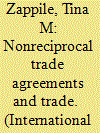| Srl | Item |
| 1 |
ID:
102939


|
|
|
|
|
| Publication |
2011.
|
| Summary/Abstract |
The recent proliferation of preferential trade agreements, reaching almost 400 in number, has made it increasingly important to determine their effects on trade flows. This study advances our understanding of the effect of a particular type of trade agreement, a nonreciprocal agreement between a major economic power and less developed countries often used as a foreign policy/foreign aid tool by the major power and allowable under WTO Special and Differential Treatment. The study tests the effect of a recently implemented nonreciprocal agreement between the United States and sub-Saharan Africa, the 2000 African Growth and Opportunity Act (AGOA), on trade. A traditional gravity model is employed to test whether AGOA opens market access in the United States for eligible countries' exports. The results of this study suggest that AGOA membership and eligibility for AGOA textile benefits have no significant effect on trade, an explicit goal of this agreement. Uncertainty about the expiration of preferences, eroding preferential margins, and the inability of African producers to adequately exploit preferences are explanations for these results.
|
|
|
|
|
|
|
|
|
|
|
|
|
|
|
|
| 2 |
ID:
155293


|
|
|
|
|
| Summary/Abstract |
We introduce a real-time problem-based simulation in which students are tasked with drafting policy to address the challenge of internally displaced persons in post-earthquake Haiti from a variety of stakeholder perspectives. Students who participated in the simulation completed a quantitative survey as a pre-/post-test on global empathy, political awareness, and civic engagement and provided qualitative data through post-simulation focus groups. The simulation was run in four courses across three campuses in a variety of instructional settings from 2013 to 2015. An analysis of the data reveals that scores on several survey items measuring global empathy and political/civic engagement increased significantly after the simulation, while qualitative student comments corroborated the results. This format of a real-time problem-based policy-making simulation is readily adaptable to other ongoing and future global crises using the framework provided in this paper.
|
|
|
|
|
|
|
|
|
|
|
|
|
|
|
|